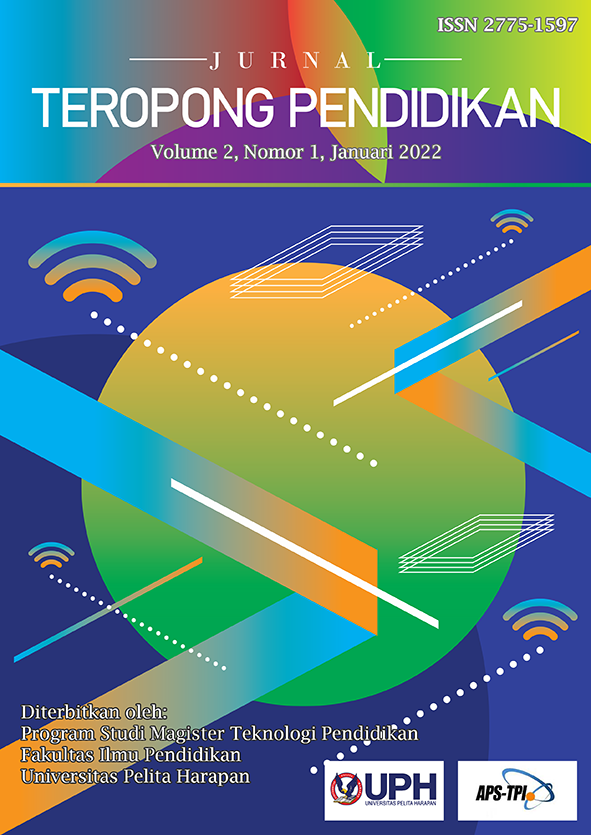Meningkatkan Identitas Nasional Dan Persepsi Positif Siswa Terhadap Globalisasi melalui Creative Productive Learning [Increasing National Identity and Student's Positive Perception of Globalization Through Creative Productive Learning]
DOI:
https://doi.org/10.19166/jtp.v2i1.5445Keywords:
Creative productive learning, national identity, globalizationAbstract
National culture and globalization are two inseparable things. Globalization plays a huge role in spreading and interacting with cultures in different parts of the world. On the one hand, there are positive aspects of globalization, such as the ease of access to information and global communication. On the other hand, globalization impacts the fading of national culture due to global interactions. This study aimed to analyze the application of creative productive learning (CPL) methods to increase the perception of national identity and students' positive perceptions of globalization. The research design in this study was classroom action research (CAR), which was conducted on 11th-grade students of SDH Daan Mogot, Jakarta, in three cycles. Data were collected through interviews, questionnaires, and documentation. This study indicates that the CPL method can increase the perceptions of national identity and students' positive perceptions of globalization.
References
Chotimah, H. C. (2018). Identitas nasional dan norma internasional sebagai pertimbangan politik Indonesia dalam merespons aksi dan jaringan terorisme global. Jurnal Politica Dinamika Masalah Politik Dalam Negeri dan Hubungan Internasional, 7(2), 189 -209. https://jurnal.dpr.go.id/index.php/politica/article/view/1131
Direktorat Pembinaan Ditjen Dikti. (2004). Peningkatan kualitas pembelajaran. Ditjen Dikti.
Giddens, A. (2000). Jalan ketiga: Pembaharuan demokrasi sosial. Gramedia.
Kemmis, S., & McTaggart, R. (1988). The action research planner. Deakin University Press.
Khasanah, N. (2019). Globalisasi dan gejalanya. Cempaka Putih.
Khor, M. (2000). Globalization and the south: Some critical issue. Third World Network.
Kohn, H. (1939). The nature of nationalism. The American Political Science Review, 33(6), 1001-1021. https://doi.org/10.2307/1948728
Kusumah, W., & Dwitagama, D. (2010). Mengenal penelitian tindakan kelas. Indeks.
Luthfia, R. A., & Dewi, D. A. (2021). Kajian deskriptif tentang identitas nasional untuk integrasi bangsa Indonesia. De Cive: Jurnal Penelitian Pendidikan Pancasila Dan Kewarganegaraan, 1(11), 1-7. https://journal.actual-insight.com/index.php/decive/article/view/270
Nurhaidah, & Musa, M. I. (2015). Dampak pengaruh globalisasi bagi kehidupan bangsa Indonesia. Jurnal Pesona Dasar, 3(3), 1-14. http://jurnal.unsyiah.ac.id/PEAR/article/view/7506
Nurhayati, D., & Ulfah, F. (2021). Tantangan pendidikan di bidang pembelajaran di era digital, dan solusinya. Prosiding Transformasi Pembelajaran Nasional, 1(1), 327-338. https://ojs.uniwara.ac.id/index.php/protrapenas/article/view/221
Setyawati, Y., Septiani, Q., Ningrum, R. A., & Hidayah, R. (2021). Imbas negatif globalisasi terhadap pendidikan di Indonesia. Jurnal Kewarganegaraan, 5(2), 306-315. https://doi.org/10.31316/jk.v5i2.1530
Sormin, Y., Furnamasari, Y. F., & Dewi, D. A. (2021). Identitas nasional sebagai salah satu determinan pembangunan dan karakter bangsa. Jurnal Pendidikan Tambusai, 5(3), 7278-7285. https://jptam.org/index.php/jptam/article/view/2140
Sulisworo, D., Wahyuningsih, T., & Arif, D. B. (2012). Identitas nasional. Universitas Ahmad Dahlan.
Suryono, H. (2008). Konfigurasi identitas nasional, nasionalisme dalam era globalisasi suatu harapan dan tantangan. MIIPS, 7(2), 157-163. https://jurnal.fkip.uns.ac.id/index.php/miips/article/view/6111
Suryosubroto. (2009). Proses belajar mengajar di dekolah. Rineka Cipta.
Wardani, I. G. A. K. (2014). Handout perkuliahan: Strategi kognitif. Program Studi Magister Teknologi Pendidikan Universitas Pelita Harapan.
Downloads
Published
Issue
Section
License
Authors who publish with this journal agree to the following terms:
1) Authors retain copyright and grant the journal right of first publication with the work simultaneously licensed under a Creative Commons Attribution License (CC-BY-SA 4.0) that allows others to share the work with an acknowledgement of the work's authorship and initial publication in this journal.
2) Authors are able to enter into separate, additional contractual arrangements for the non-exclusive distribution of the journal's published version of the work (e.g., post it to an institutional repository or publish it in a book), with an acknowledgement of its initial publication in this journal.
3) Authors are permitted and encouraged to post their work online (e.g., in institutional repositories or on their website). The final published PDF should be used and bibliographic details that credit the publication in this journal should be included.







